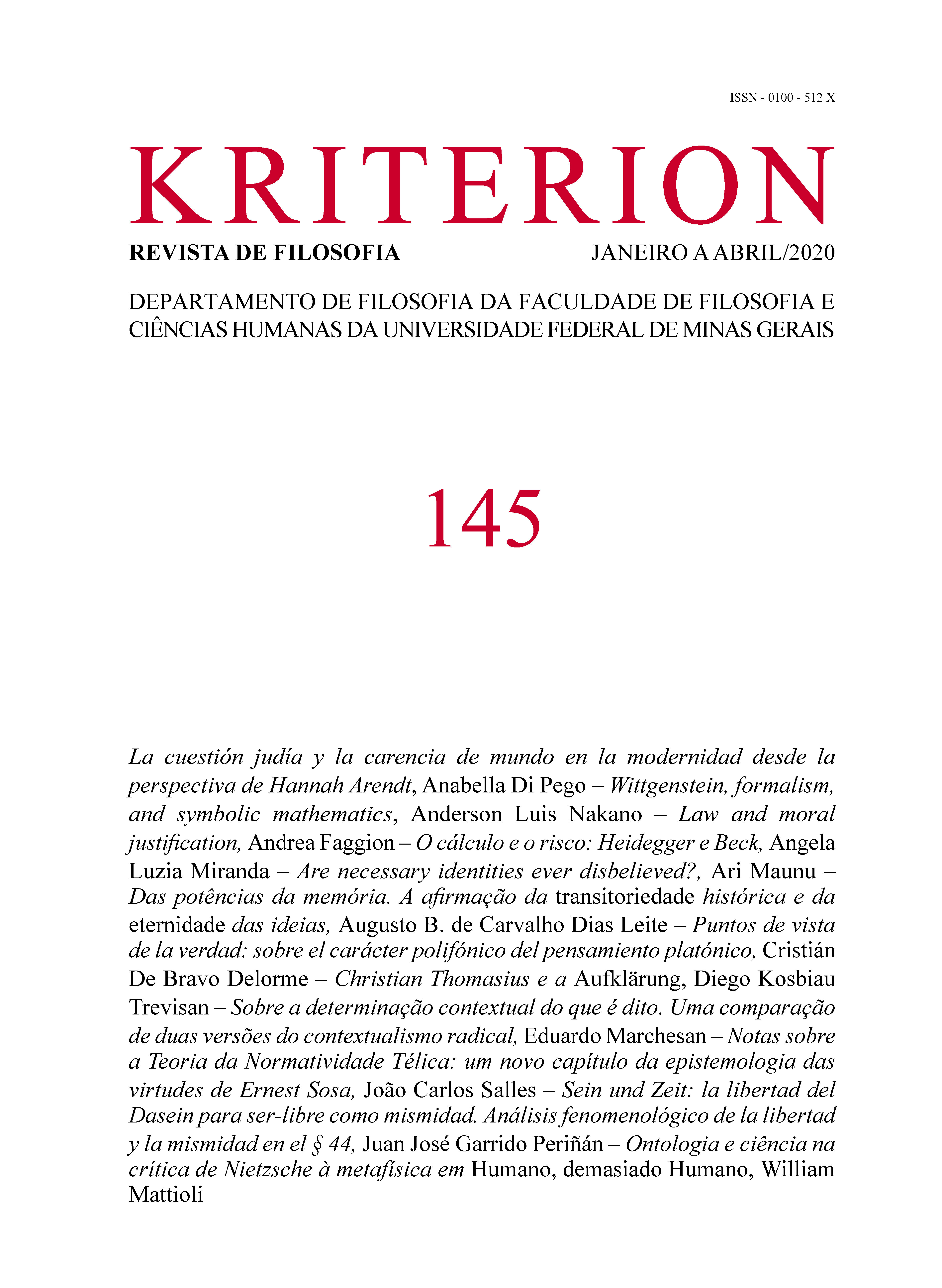PUNTOS DE VISTA DE LA VERDAD: SOBRE EL CARÁCTER POLIFÓNICO DEL PENSAMIENTO PLATÓNICO
Palavras-chave:
Diálogo, verdad, polifonía, perspectivaResumo
El siguiente artículo tiene como objetivo destacar el carácter polifónico del pensamiento platónico y poner en cuestión el sentido de la autoría de Platón. Suponer, a partir de obstinados prejuicios modernos, que Platón, tal como cualquier escritor moderno, habría expuesto su propia doctrina, es ignorar la importancia de la forma dramática de su pensamiento. El testimonio de la variedad de interlocutores y de puntos de vista que se suceden en los diferentes diálogos, nos invita a prestar atención a la compleja trama del pensamiento platónico, cuya variedad de funciones corresponde a los límites y al alcance del discurso de quienes en un determinado momento y situación cooperan en el diálogo.
Referências
ARIETI, J. “A dramatic interpretation of Plato’s Phaedo”. Illinois Classic Studies XI, 1986, pp. 129-142.
ARISTÓTELES. “Art of Rhetoric”. Cambridge MA: Harvard University Press, 2006.
BURKERT, W. “Lore and Science in Ancient Pythagoreanism”. Translated by E. L. Minar Jr. Cambridge MA: Cambridge University Press, 1972.
BURNET, J. “Platonis Opera”, Oxford: Oxford Clarendon Press, 1900-1907.
CICERÓN. “Cuestiones académicas”. Versión de Julio Pimentel Álvarez, México: Universidad nacional autónoma de México, 1990.
DIOGENES LAERCIO. “Lives of Eminent Philosophers”. Vol. I. Translated by R. D. Hicks. Loeb Classical Library, Cambridge, MA: Harvard University Press, 1925.
EUBEN, J. P. “Reading democracy: ‘Socratic dialogues and the political education of democratic citizens”. In: J. Ober and C. Hedrick (eds), Dêmokratia, Princeton: Princeton University Press, 1996, pp. 327-359.
FRIED, G, “Back to the Cave: A Platonic Rejoinder to Heidegger”. In: D. Hyland and J. P. Manoussakis (eds.). Heidegger and the Greeks. Bloomington: Indiana University Press, 2006, pp. 157-176.
GONZÁLEZ, F. “Plato’s Perspectivism”. Plato Journal 16. Coimbra: Coimbra University Press, 2017.
HEIDEGGER, M. “Sein und Zeit”. Tübingen: Max Niemeyer Verlag, 1976.
HEIDEGGER, M. “Phänomenologische Interpretationen zu Aristoteles/Einführung in die Phänomenologische Forschung”. GA 61, Frankfurt am Main: Vittorio Klostermann, 1992.
HUFFMAN, C. (ed.) “A History of Pythagoreanism”. Cambridge: Cambridge University Press, 2014.
KAHN, C. “The philosophical importance of the dialogue form for Plato”. In: J. Fink (ed.). The development of dialectic form Plato to Aristotle, Cambridge: Cambridge University Press, 2012.
KANT, I. “¿Qué es la Ilustración?”. Traducción de R. Aramayo. Madrid: Alianza editorial, 2013.
KARAMANOLIS, G. “Plato and Aristotle in agreement?” Oxford: Oxford University Press, 2006.
KOSMAN, L. A. “Charmides’ first definition: sophrosyne as quietness”. In: J. P. Anton and A. Preuss (eds.), Essays in Ancient Greek Philosophy, Vol. 2, Albany: State University of New York Press, 1983, pp. 203-216.
LAYNE, D. “The character of Socrates and the good of dialogue form: Neoplatonic hermeneutics”. In: H. Tarrant and D. Layne (eds.), The Neoplatonic Socrates, Philadelphia: University of Pennsylvania Press, 2014.
MAESTRO, J. G. “Contra las Musas de la Ira. El Materialismo Filosófico como Teoría de la Literatura”. Oviedo: Pentalfa ediciones, 2014.
MONOSON, S. “Plato’s Democratic Entanglements”.Princeton: Princeton University Press, 2000.
NIETZSCHE. F. “Über das Verhältniss der Rede des Alcibiades zu den übrigen Reden des platonischen Symposions” (Traducción de Sergio Sánchez). In: Werke. Kritische Gesamtausgabe (KGW I, III), herausgegeben von G. Colli und M. Montinari, Berlin and New York: Walter de Gruyter, 2006.
NOVOTNÝ, F. “The Posthumous life of Plato”. The Hague: Martinus Nijhof, 1977.
PHILIP, J. “The Platonic Corpus”. Phoenix, Vol. 24, Nr. 4, 1970, pp. 296-308.
PLATÓN. “Diálogos” I-II, varios traductores. Madrid: Gredos, 2011.
PLATÓN. “Diálogos”VII, varios traductores. Madrid: Gredos, 1992.
PRESS, G. “Introduction”. In: G. Press (ed.), Who’s speak for Plato? Studies in Platonic Anonymity, Lanham: Rowman and Littlefield Publishers, 2000.
POPKIN, R. The History of Scepticism, Oxford: Oxford University Press, 2003.
PUCHNER, M. “The Drama of Ideas”. Oxford: Oxford University Press, 2010.
REMES, P. “Neoplatonism”. Stocksfield. Acumen, 2008.
SCHMID, W. “On manly courage: A study of Plato’s Laches Philosophical Explorations”. Illinois: Southern Illinois University Press, 1992.
TARRANT, H. “Scepticism or Platonism?”. Cambridge: Cambridge University Press, 1985.
TARRANT, H. “Plato’s first interpreters”. Ithaca: Cornell University Press, 2000.
THESLEFF, H. “Platonic Patterns”. Las Vegas: Parmenides Publishing, 2009.
TIGERSTEDT, E. N. “The Decline and Fall of the Neoplatonic Interpretation of Plato”. Helsinki: Societas Scientiaru Fennica, 1974.
TIGERSTEDT, E. N. “Interpreting Plato”. Stockholm Sweden: Almqvist & Wiksell International, 1977.
VALLEJO, A. “Platón. El filósofo de Atenas”. Barcelona: Montesinos, 1996.
VLASTOS, G. “Platonic Studies”. Princeton: Princeton University Press, 1973.
VLASTOS, G. “Socrates. Ironist and Moral Philosopher”. Cambridge: Cambridge University Press, 1991.
WESTERINK, I. “Anonymous Prolegomena to Platonic Philosophy”. Amsterdam: North-Holland Publishing Co., 1962.
WOODBRIDGE, F. “The Son of Apollo. Themes of Plato”. Cambridge: The Riverside Press, 1879.










